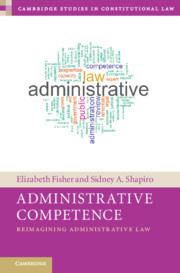Book contents
- Administrative Competence
- Cambridge Studies in Constitutional Law
- Administrative Competence
- Copyright page
- Dedication
- Contents
- Abbreviations
- Acknowledgments
- 1 The State We Are In
- Part I Making Administrative Competence Visible
- Part II Confronting the Origin Myths of Administrative Law
- Part III The Law of Public Administration
- Bibliography
- Index
Part III - The Law of Public Administration
Published online by Cambridge University Press: 02 October 2020
- Administrative Competence
- Cambridge Studies in Constitutional Law
- Administrative Competence
- Copyright page
- Dedication
- Contents
- Abbreviations
- Acknowledgments
- 1 The State We Are In
- Part I Making Administrative Competence Visible
- Part II Confronting the Origin Myths of Administrative Law
- Part III The Law of Public Administration
- Bibliography
- Index
Summary
As the law of public administration, judicial review is fundamental. As Louis Jaffe stated in 1965, the “availability of judicial review is the necessary condition, psychologically if not logically, of a system of administrative power which purposes to be legitimate or legally valid.”1 As a forum for active and authoritative accountability, it ensures the worthiness of the administrative state to be recognized. But judicial review for the sake of judicial review is not prima facie meaningful. If it is to be a form of meaningful accountability,2 it must take both administrative authority and capacity into account. As we have said in Chapter 1, the legitimacy of the administrative state depends not only on the legal authority to act, but on the administrative capacity to implement statutory mandates.
- Type
- Chapter
- Information
- Administrative CompetenceReimagining Administrative Law, pp. 215 - 297Publisher: Cambridge University PressPrint publication year: 2020

